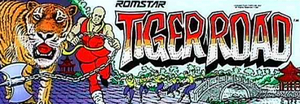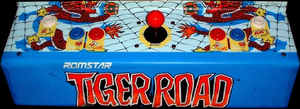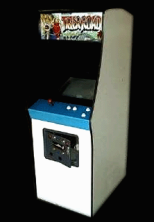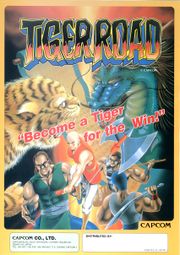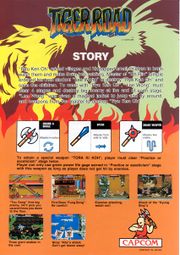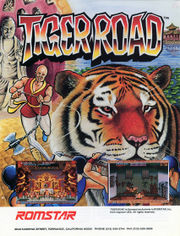Lost In Translation/Tiger Road
| Tiger Road | |
|---|---|
| Manufacturer | Capcom (Romstar license) |
| Released | 1987 |
| Control Method |
8-way Joystick 2 Button(s) |
| Main CPU | 68000 (@ 6.000 MHz) Z80 (@ 4.000 MHz) |
| Sound CPU | Mono (2x) YM2203 (@ 3.580 MHz) |
| Video Details |
Raster (Horizontal) 256 x 224 pixels 60.00 Hz 576 Palette colours |
| Screens | 1 |
| ROM Info | 18 ROMs 1,933,568 bytes (1.84 MiB) |
| MAME ID | tigeroad · tigerodb · toramich |
About The Game
Tiger Road is an arcade video game.
'Ryu Ken Oh' raided villages and kidnapped small children to brainwash them and make them into soldiers. Master of 'Oh Rin' temple ordered his best student 'Lee Wong' to destroy 'Ryu Ken Oh' and save the children. To meet with 'Ryu Ken Oh', 'Lee Wong' must clear 4 stages and destroy big enemy at the end of each stage. 'Lee Wong' was given a magical jacket to jump and fly around, and weapons from the master to destroy 'Ryu Ken Oh'.
Additional Technical Information
Players : 2
Control : 8-way joystick
Buttons : 2 (ATTACK, JUMP)
Trivia
Released in November 1987.
Licensed to Romstar for US manufacture and distribution (December 1987).
This game is known in Japan as "Tora-he no Michi".
Alfa Records released a limited-edition soundtrack album for this game (Capcom Game Music Vol.3 - 28XA-204) on 25/04/1988.
Updates
- Tiger Road has a stage select, unlike the Japanese version.
- All the voices from the Japanese "Tora-he no Michi" have been removed in Tiger Road.
Tips and tricks
- To obtain a special weapon 'Tora Ki Koh', player must clear 'practice or asceticism' stage twice. Player can only use green power life gage earned in 'practice or asceticism' stage with this weapon as long as player does not get hit by enemies.
Staff
- Director & Martial Arts Guidance
- Lee Wong
- Planners & Directors
- Lee Wong
- Shin Wong
- Special Effects
- Chan Yuki
- Tom Yang
- Mah Shing
- Art Experts
- Ryu Kyu
- Ei Show
- Take Pong
- Art Stagehands
- Wody Ring
- Chan Sada
- Chan Lee
- Moh Ring
- Koh Emy
- Koh Elliy
- Ziggy Yoe
- Stagehand
- Ji Shing
- Sound Effects
- Hero Yoe
- Mie Maru
- Music By
- Harumi Fujita
- Tamayo Kawamoto (7 non-specified tracks)
- Junko Tamiya (Training Bonus Stage)
Cabinet and Artwork
Ports
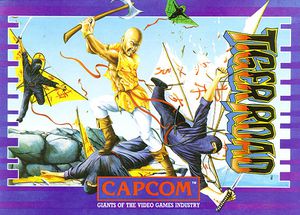
- Consoles
- NEC PC-Engine (1990)
- Sony Playstation 2 (2006, "Capcom Classics Collection, Volume 2")
- Microsoft XBOX (2006, "Capcom Classics Collection, Volume 2")
- Computers
- Atari ST (1987)
- Commodore C64 (1988)
- Amstrad CPC (1988)
- Sinclair ZX Spectrum (1988)
- Commodore Amiga ("Tiger Road", 1987, Go!)
Soundtrack Releases
| Album Name | Catalogue No. | Released | Publisher | Comments |
|---|---|---|---|---|
| Capcom Game Music VOL.3 | 28XA-204[1] | 1988-04-20 | Alfa Records | CD version. |
| Capcom Game Music VOL.3 | ALC-22924[2] | 1988-04-20 | Alfa Records | Cassette version. |
| Capcom Game Music VOL.3 | ALR-22924[3] | 1988-04-20 | Alfa Records | Vinyl version. |
| Capcom Game Music VOL.3 | SCDC-00198[4] | 2002-08-21 | Scitron Digital Content Inc. | CD version. |
| GS SELECTION - GS Club Special Project | N/A[5] | 1988-03-01 | Softbank Publishing | Double vinyl version. |
External Links
- Sinclair ZX Spectrum version of Tiger Road at the World of Spectrum


